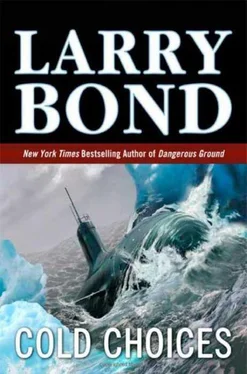He liked being imposing. His office was finished in rich colors with dark wood and filled with overstuffed furniture. The walls were covered with paintings and large photographs of great moments in Russian naval history. A bust of Fyodor Ushakov watched everyone from one corner, while flags of the Russian Federation and the Navy stood in the other.
Kokurin was the commander of the Russian Northern Fleet, and while it was smaller and weaker than the force he’d known as a young man, he loved it with all the devotion and protectiveness of a father.
Some of his men were missing, and he’d directed the entire Northern Fleet to do everything in its power to find Severodvinsk and rescue the crew, if they were still alive. He’d said so a dozen times since the crisis began. Everything that could be done was being done. He had his people keeping track of the rescue mission. He received briefings on their progress twice a day.
So why was he sitting behind the desk that had belonged to Admiral Ushakov, cornered like an animal by a pack of angry babushkas?
No, that isn’t true, he thought to himself. A babushka is an old woman, a Russian grandmother or a mother-in-law. They were a force to be reckoned with, as fierce and relentless as a Russian winter. But this group included some young women as well, wives and mothers, some barely out of their teens.
The seven women in his office, quietly seated in an assortment of chairs, calmly drinking tea, were causing more problems than a collision at sea, than a weapons accident. he’d dealt with those things in his naval career. They had been Navy matters, handled within the Navy, and whatever the resolution, the matter had stayed inside the Navy’s haze-gray walls.
But these wives and mothers had taken Severodvinsk’s loss outside the Navy, demanding answers from the government.
Kokurin remembered all too well the loss of Kursk. That tragedy, as well as the debacle in Chechnya, had been the start. The families of that submarine had been able to organize and demand an investigation, and they’d gotten it. As far as he was concerned, the Navy had expended almost as much effort satisfying the families as it had in finding and raising the submarine.
It had been different when he joined the fleet. Families were expected to sacrifice along with their servicemen, and to do so in silence. Discussing operational details or flaws or problems in training or materiel revealed valuable information. An enemy, especially one with the resources of the USA or NATO, could exploit those flaws. The Navy had actually released the official report of the Kursk investigation to the families. Normally such a document would have been highly classified, and now there were copies of it on the Internet!
The defense minister had virtually ordered him to meet with the families. “Say whatever will make them happy. Remember to blame the Americans. This crisis is their fault.”
Olga Sadilenko, the spokesperson for the group, was a hard case. The mother of Severodvinsk’s reactor officer, she was articulate and unimpressed by busts, flags, paintings or admirals. Her questions were maddeningly simple.
“Have you confirmed the Americans’ information?”
“If you mean the location they provided, no, we haven’t. A Navy spokesman has suggested that the Americans may have deliberately given us incorrect information,” Kokurin answered.
“But that makes no sense,” the woman responded. “Why admit your involvement and then lead the searcher to the wrong place? What did the ships find there?”
“I’m sorry, Mrs. Sadilenko, I’m not at liberty to say. There have been indications that the American is deliberately interfering with the search.”
“How is he doing this?” Sadilenko demanded. “Why have your ships not driven him from the area?”
“That information is classified.”
Kokurin had tried to sound final, but Sadilenko wasn’t deterred. “Why classify it? The Americans obviously know, our Navy knows, and”—she paused to look at her notes—”Captain-Lieutenant Rvanin made the accusation public yesterday morning.”
She looked straight at Kokurin. “If the Americans’ actions are harming our progress, shouldn’t we share our evidence with the world? Make them explain themselves?”
“I’m sorry, madam, I cannot explain further.”
Sadilenko looked unhappy, and the women broke into sudden discussion, everyone seeming to talk at the same time. It trailed off with Sadilenko nodding. She turned back to Kokurin.
“Did the search forces at least include the Americans’ information in their plan?”
“I’m sorry, that is classified.”
“Do you know where the American submarine is?”
“That is also classified.”
“Have you attempted to communicate with the American submarine?”
“No, we have not. There is no way to know if the Americans will tell us the truth.”
“You can learn much from a man’s lies,” Sadilenko countered, quoting an old proverb.
Kokurin paused, but decided to ignore the accusation.” Severodvinsk is a Russian Federation Navy submarine that was engaged in routine operations when it was lost. The Navy is searching for it now with every means at its disposal. We want our men back as much as you want them back, and we have the added task of finding the cause of the accident and bringing to account those responsible.”
One of the women, young with a face puffy from crying, stood up in back. “My friend says her husband is still in port. Her youngest is sick and he called to see if the baby was better. But he can’t do that unless he’s in port, can he?”
“He shouldn’t have called at all. He violated regulations. What is your friend’s name?”
“I won’t tell you. This isn’t like the old days. You can’t arrest anyone for that. She has a family.”
Sadilenko asked, “How can they be searching if they’re still in port? Is the storm keeping them there? The Navy spokesman said two days ago that the storm wasn’t interfering with the rescue.”
Kokurin felt impatience rising. He wasn’t used to being argued with. They were only women, unused to naval discipline and prone to emotion. But enough was enough.
Kokurin stood. “Fleet movements are highly classified.” He tried to look directly at the young woman, but the others leaned toward her protectively. “Your friend’s husband serves on one ship, whichever ship it is. There are many ships involved in the search, and we do not tell anyone outside the chain of command the location of our warships.”
Sadilenko ignored Kokurin’s hint that it was time to leave. “We would like to have a liaison assigned to the search and rescue force. He is the father-in-law of one of the missing officers, and a retired submariner. He could monitor the rescue effort and send regular updates to us here.”
Kokurin was horrified at the thought. Let an outsider watch their operations? He’d rather blow a hole in the side of the flagship. It didn’t matter that the man they suggested was a retired naval officer. In fact, dealing with a civilian would be easier. A former Navy man might see and understand too much. It was a tailor-made security breach.
“Absolutely not. It’s against regulations to have a civilian, even a retired naval officer, on a ship during possible combat operations.”
“Then he could work here, at headquarters.”
“No. He would see too much classified information.”
“But he’s been cleared.”
Kokurin paced behind his desk. “That was while he was in active service. He can tell you that his clearances were taken away when he retired.”
“But you can give them back.”
“Impossible. He’d have to be investigated all over again, and that takes time. The rules are quite clear on this matter.”
Читать дальше












